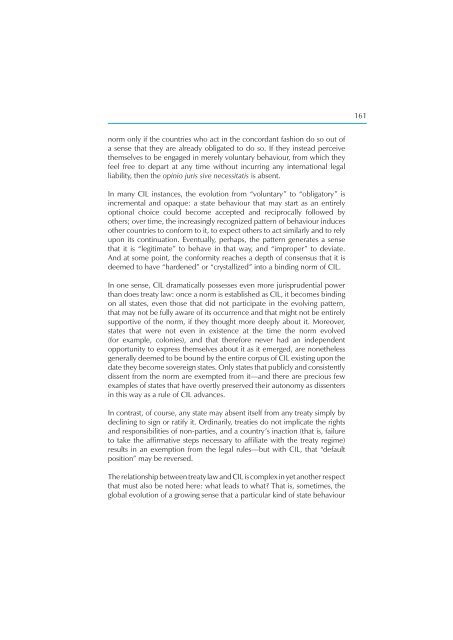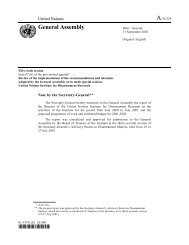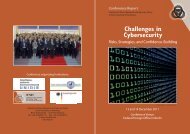Security in Space The Next Generation - UNIDIR
Security in Space The Next Generation - UNIDIR
Security in Space The Next Generation - UNIDIR
You also want an ePaper? Increase the reach of your titles
YUMPU automatically turns print PDFs into web optimized ePapers that Google loves.
norm only if the countries who act <strong>in</strong> the concordant fashion do so out of<br />
a sense that they are already obligated to do so. If they <strong>in</strong>stead perceive<br />
themselves to be engaged <strong>in</strong> merely voluntary behaviour, from which they<br />
feel free to depart at any time without <strong>in</strong>curr<strong>in</strong>g any <strong>in</strong>ternational legal<br />
liability, then the op<strong>in</strong>io juris sive necessitatis is absent.<br />
In many CIL <strong>in</strong>stances, the evolution from “voluntary” to “obligatory” is<br />
<strong>in</strong>cremental and opaque: a state behaviour that may start as an entirely<br />
optional choice could become accepted and reciprocally followed by<br />
others; over time, the <strong>in</strong>creas<strong>in</strong>gly recognized pattern of behaviour <strong>in</strong>duces<br />
other countries to conform to it, to expect others to act similarly and to rely<br />
upon its cont<strong>in</strong>uation. Eventually, perhaps, the pattern generates a sense<br />
that it is “legitimate” to behave <strong>in</strong> that way, and “improper” to deviate.<br />
And at some po<strong>in</strong>t, the conformity reaches a depth of consensus that it is<br />
deemed to have “hardened” or “crystallized” <strong>in</strong>to a b<strong>in</strong>d<strong>in</strong>g norm of CIL.<br />
In one sense, CIL dramatically possesses even more jurisprudential power<br />
than does treaty law: once a norm is established as CIL, it becomes b<strong>in</strong>d<strong>in</strong>g<br />
on all states, even those that did not participate <strong>in</strong> the evolv<strong>in</strong>g pattern,<br />
that may not be fully aware of its occurrence and that might not be entirely<br />
supportive of the norm, if they thought more deeply about it. Moreover,<br />
states that were not even <strong>in</strong> existence at the time the norm evolved<br />
(for example, colonies), and that therefore never had an <strong>in</strong>dependent<br />
opportunity to express themselves about it as it emerged, are nonetheless<br />
generally deemed to be bound by the entire corpus of CIL exist<strong>in</strong>g upon the<br />
date they become sovereign states. Only states that publicly and consistently<br />
dissent from the norm are exempted from it—and there are precious few<br />
examples of states that have overtly preserved their autonomy as dissenters<br />
<strong>in</strong> this way as a rule of CIL advances.<br />
In contrast, of course, any state may absent itself from any treaty simply by<br />
decl<strong>in</strong><strong>in</strong>g to sign or ratify it. Ord<strong>in</strong>arily, treaties do not implicate the rights<br />
and responsibilities of non-parties, and a country’s <strong>in</strong>action (that is, failure<br />
to take the affi rmative steps necessary to affi liate with the treaty regime)<br />
results <strong>in</strong> an exemption from the legal rules—but with CIL, that “default<br />
position” may be reversed.<br />
<strong>The</strong> relationship between treaty law and CIL is complex <strong>in</strong> yet another respect<br />
that must also be noted here: what leads to what? That is, sometimes, the<br />
global evolution of a grow<strong>in</strong>g sense that a particular k<strong>in</strong>d of state behaviour<br />
161








